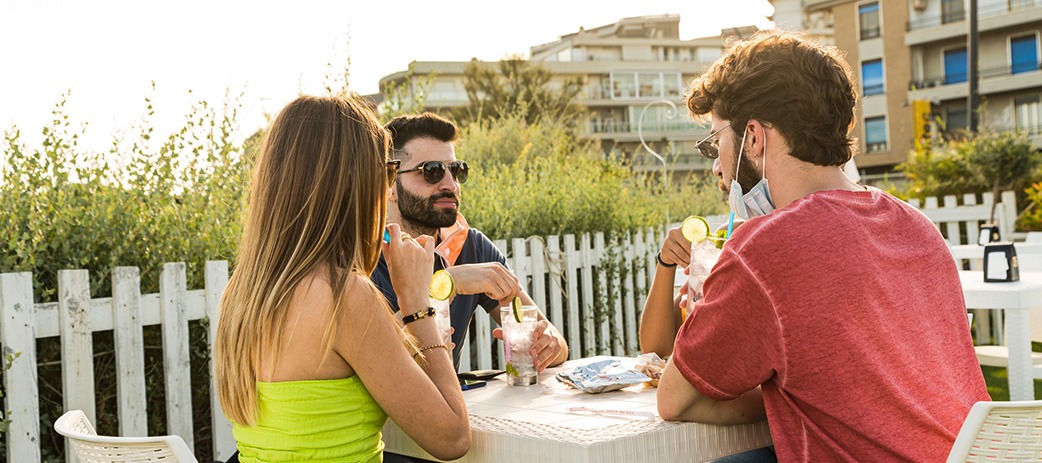Hooray! We've made it to Level 1 of lockdown: the curfew is later, restaurants and bars can increase capacity, alcohol restrictions are eased, and more emphasis is being placed on personal responsibility – all right in time for the iconic South African summer.
But is it too soon to start celebrating?
Like every other activity, dining out has had to adjust to the coronavirus pandemic. Distance, caution, and compliance are in charge of where, when, and how we eat out now.
A reminder that while you can’t get COVID-19 from food itself, you can get it if someone who has it touches your food. In general, while safety measures decrease the risk of virus transmission, they do not eliminate it.
Eleanor J. Murray, ScD, an assistant professor of epidemiology at Boston University School of Public Health in Massachusetts, lists the factors that affect how prone you might be to transmission. They include:
- How much time you spend in proximity to other people
- How close in proximity you are to them
- Whether you’re in an indoor space versus a more ventilated or outdoor space
- How physically crowded you are and how much of that crowding is with people that you don’t typically come in contact with
If you know there’s a coronavirus outbreak in your area, or the number of active cases has spiked recently or are comparatively high to other areas, it might be wise to wait until they drop before dining out. If you or any of your guests are high-risk, rather wait. Some of the most common risk factors include cancer, old age, obesity, heart conditions and sickle cell disease.
If you and your guests are otherwise healthy and feel the risk is worth it, check ahead of time that the restaurant is fully compliant with the safety regulations for offering hospitality services during the Covid-19 pandemic. You can download the entire RASA Covid-19 Safe Operating Procedures document here.
You can also call the restaurant or eatery you’re considering going to and ask them questions. Mugg & Bean has a great list of coronavirus safety questions for restaurants here (and they answer them, too). You can ask eateries about their health screening process and ask to see proof that they’ve recently recorded staff wellness.
According to Dr. Stephen Berger, an infectious disease expert and co-founder of the Global Infectious Diseases and Epidemiology Network (GIDEON), “Before dining in a restaurant, the big question to ask is, simply, ‘Do they adhere to social distancing?’” he told Healthline. “Before sitting down and asking for a menu, check to confirm that the restaurant staff is wearing masks, and that these masks cover their noses and mouths.”
You can also ask the manager if you can take a peek in the kitchen to check; your safety shouldn’t be an imposition. The same goes for inquiring about whether staff have correctly stowed their personal items (clothing, wallet, bag, etc.) for their shift – everything needs to be sealed.
The business also needs to provide staff with all the Personal Protective Equipment (PPE) required, and make sure they use it. Visors are not as safe as masks, and gloves can give a false sense of safety and lull wearers into washing their hands less.
Surfaces that could be contaminated include but are not limited to salt and pepper shakers, chairs, tabletops, table cloths, menus, cutlery, crockery, glasses, cups, and condiment containers. Hygiene is all the more important in this day and age, and a restaurant that was already much-loved for its cleanliness is probably ahead of the Covid-19 safety game.
Social distancing with 1,5 m gaps between people must be observed and enforced, whether it’s with physical obstructions, visual guidelines, verbal instructions, or a combination of these.
Your waiter needs to recognise and respect his or her role as your virus-proof server, and keep a distance, place items on the table (not into your hand) and not touch the accompanying serviettes that are brought to the table at the same time as the food and drink. Yoco has an extensive checklist for eateries that we found useful as patrons here.
Your part
It goes both ways, of course, and the virus doesn’t discriminate.
To ensure you do not unintentionally pass the virus on to others at a restaurant or cafe, you’re legally required to register and state if you’ve had any symptoms, visibly sanitise hands, have your temperature taken, wear a mask on entry, and continue to wear the mask when not chewing or sipping.
Eye Witness News reported at the end of August that some restaurants are finding that visitors won’t comply with safety regulations. “We are asking people to please be respectful of staff and the protocols in place,” Wendy Alberts, CEO of RASA (Restaurant Association of South Africa) urged patrons.
If you’re feeling a little more “hooray” about safety practices and are ready to take a drive to your favourite diner, be as safe in your car as you are at the (salad) bar. Get car insurance in under 5 minutes!



